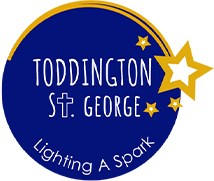Assessment
At Toddington St George, children are assessed during every lesson, which enables our teachers to plan the next steps for each child. Teachers assess against the learning objectives and the basic skill requirements for each year group by providing live feedback throughout the lesson. This enables pupils to make progress within individual lessons and over time.
Children are expected to make good or better progress in all subjects and this is reported to parents and carers at parents’ evenings, mid-year and end of year reports.
Toddington St Georges uses triangulated monitoring throughout the year to gauge the impact of curriculum design. Senior Leaders and Subject Leaders monitor individual subjects by: reviewing learning, evaluating pupil voice, providing feedback to move practice forward, celebrating positives and highlighting areas of development that through collaboration and continued professional development are developed and strengthened.
Subject progression maps enable subject leaders to monitor coverage of subject areas across the school, so that teachers can plan to provide the greatest breadth and balance. These strategies enable teachers to plan for intervention and challenge within the wider curriculum.
We will assess teaching and learning through:
Summative assessments
- Statutory checks - KS1 - Phonics Screening Check (PSC), Year 4 - Multiplication Check (MTC)
- Benchmark tests - start of unit and end of unit assessment
- Online assessments - Accelerated Reader Star reader text and end of book quizzes
- Classroom assessments at the end of a unit of study.
- Key stage assessments that form part of a national curriculum.
- Standardised tests - Progress in reading (PIRA), Progress in Maths (PUMA) and Progress in Grammar, Punctuation and Spelling (GAPS).
Formative assessments
- Observations
- Low stakes quizzes in class
- Practice and retrieval strategies
- Think-pair share
- Self and peer assessment
- Ongoing in class assessment for learning - often, during, end of lessons




